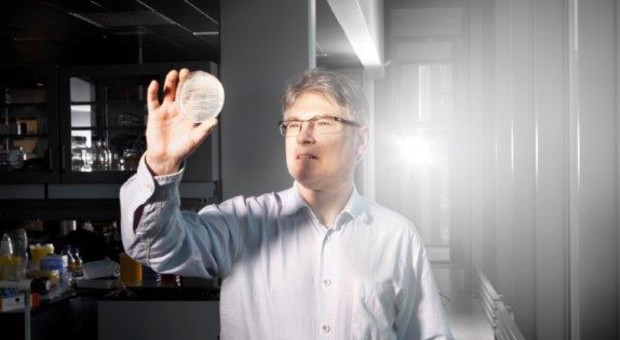New knowledge and inspiration from abroad is continually required for Denmark to lead in research.
This is why the Novo Nordisk Foundation established the Laureate Research Grants. The 7-year grants of DKK 40 million (€5.5 million) aim to bring international leading researchers within biomedicine and biotechnology to Denmark and strengthen the Danish research environment.
Kenn Gerdes received one of the first of these grants nearly 2 years ago. Since then, he has gradually moved all his research activities from Newcastle University in the United Kingdom to the University of Copenhagen.
– At Newcastle, I was part of one of the world’s best molecular microbiology environments. This provided me with professional knowledge and inspiration as well as insight into how scientists can help each other rather than only compete. I hope to carry forward this knowledge and way of working to my own students and other groups, says Kenn Gerdes.
This internationally renowned professor is one of the world’s leading researchers of bacterial persistence, a common cause of chronic, relapsing or even lethal infections.
– Penicillin is an outstanding medicine for combating bacteria. However, penicillin cannot kill all bacteria, often requiring treatment to be repeated again and again, which risks developing resistance, says Kenn Gerdes.
He explains that one reason why the bacteria stay alive is that they have a secret weapon:
– Bacteria respond when attacked by the body’s immune system. One response involves some of the bacteria going into hibernation, thereby making them unresponsive to the immune system or antibiotics. Not so many bacteria go into hibernation in the initial stages of an infection. However, our studies have shown that later, especially when the bacteria are stressed, up to one tenth can go into hibernation.
– We have discovered that this hibernation is controlled by a particular molecule that exists in practically speaking all pathogenic bacteria. The molecule is necessary for the bacteria to produce an infection. The molecule controls the mechanisms of the bacteria, which ensures that they remain alive in the host organism.
BETTER TREATMENT
Kenn Gerdes’ research in Denmark is improving the understanding of how these molecules trigger the bacteria to hibernate with the aim of advancing new methods for combating the recurrence of chronic infections.
– The most important thing for us is to understand the underlying process. Finding a chemical compound that can inhibit the enzyme that creates this molecule may lead us to a new antibiotic and thus better treatment options, says Kenn Gerdes, who has also recently received a grant from the Danish National Research Foundation to establish a centre of excellence to carry out further research on how bacteria enter hibernation and how they emerge again.
After 8 years in Newcastle, Kenn Gerdes was looking forward to arriving in Copenhagen:
– The conditions in Newcastle were excellent, but I am a Dane and I would prefer to be in Denmark’s system and help educate Danish students, he says.
Lars Fugger, member of the Board of the Novo Nordisk Foundation and Chair of the Foundation’s Committee on Laureate Research Grants, says:
– Being able to attract researchers such as Kenn Gerdes is valuable for Denmark. The presence of internationally leading researchers will improve the quality of Danish research and also inspire young talented researchers.








